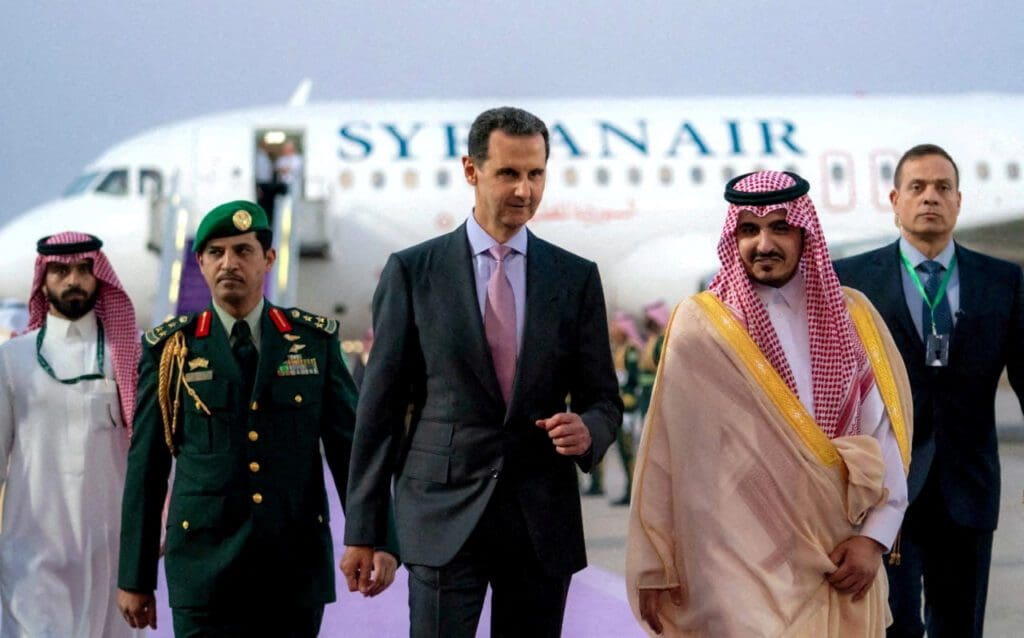In May 2023, Syria returned to the Arab League following a near-12-year suspension. The move has far-reaching implications for both the region and the international community. It came after more than a decade of widespread atrocities by Bashar Al-Assad’s regime against its own citizens, abuses that have cast a long shadow over Syria’s relationships with its neighbors. The country’s reintegration into the regional bloc signified a return after years of diplomatic isolation and signaled that the majority of Arab states have begrudgingly accepted the Assad government as the official representative of the Syrian people.
The Arab states’ decision was less an endorsement of Assad’s regime than an acknowledgment of the inescapable geopolitical realities imposed by his enduring hold on power. It also reflected a shift in regional interests and the balance of power, as well as highlighting the divide between the Arab world and the West over how to address the ongoing Syrian crisis.
However, Syria’s return to the Arab regional bloc raises a key question: how does Iran, a close ally of the Syrian regime and a major actor in the Middle East, perceive this development? Some observers have speculated that the acceptance of Assad, particularly by the Gulf Cooperation Council (GCC) states, was primarily driven by a desire to rein in Iran’s regional influence. Bringing Syria in from the cold, they suggest, might serve to offset Iran’s leverage in Damascus.
However, sources close to the Iranian government and local experts have painted a different picture, arguing that Tehran welcomes the move. They suggest that Iran supports the reestablishment of Syria’s diplomatic legitimacy and the “revival of its power.” Al-Alam, an Arabic-language TV channel affiliated with the Islamic Republic, even emphasized the crucial role Iran’s support had played in securing Syria’s return to the Arab League.
Iran’s Role in Syria Amid Regional Diplomatic Shifts
On the eve of the Arab League summit in Jeddah, Iranian President Ebrahim Raisi visited Syria, leading a delegation of high-ranking officials. Raisi was the most senior Iranian official to visit Damascus since the onset of the Syrian conflict in 2011. State media and officials in Iran praised the visit, calling it a sign of the “victory of the axis of resistance.” Raisi’s visit was also interpreted as a show of Iran’s continuing influence in Syria.
It is also notable that the bloc’s decision to readmit Syria came just two months after Iran and its key regional rival Saudi Arabia announced a reconciliation deal ending seven years of open hostility and severed relations. Some observers have argued that Syria would likely not have been re-admitted into the Arab League without this prior rapprochement between Tehran and Riyadh.
Iran’s official reaction to Syria’s reentry into the Arab League was positive and congratulatory. Foreign ministry spokesman Nasser Kanaani said that “resolving differences among Islamic countries and fostering convergence and cooperation among them has positive outcomes for overall stability and peace” in the region, and that “the Islamic Republic of Iran welcomes this approach.” Ali-Asghar Khaji, a senior advisor to Iran’s foreign minister, welcomed “the positive developments in the relations between Arab states and Syria,” saying they would “benefit the people and security of the region.”
Opportunities and Challenges for Tehran
All this reflects a largely positive Iranian stance on Syria’s return to the Arab fold, at least officially. In the Iranian narrative, the Arab states’ decision to welcome Assad back is a triumph of “resistance” against a “foreign plot” that had sought to topple him.
Iran also sees the move as legitimizing its own support for Assad, now acknowledged by his Arab counterparts as Syria’s leader. Furthermore, Syria’s return to the Arab League could catalyze its economic recovery and reconstruction. The role of Arab states in these efforts could further consolidate Iran’s ally, Assad, and even present Tehran with prospects for economic cooperation with certain Arab states, particularly given the recent easing of relations with Saudi Arabia. Iran may view this as an opening to improve its own ties with Arab states.
Moreover, as Iran’s stalwart ally, Syria’s reentry into the Arab League could provide Iran with a platform to influence the bloc’s decisions. This could potentially disrupt the organization’s general anti-Iranian stance, thereby granting the Islamic Republic an element of diplomatic leverage in regional politics.
Despite all this, Iran is aware that Syria’s reintegration into the Arab League could reduce its dependence on Tehran as it increases its engagement with other regional players. The Iran-GCC rapprochement has primarily been focused on reducing the risk of conflict and restoring normal relations, at least for now. The thaw has yet to address deeply entrenched ideological, political, and economic rivalries that have characterized these relationships for decades. Along with Iran’s limited economic capacity due to sanctions and rampant corruption, enhanced Arab involvement in Syria could eclipse Iran’s economic interests. Some in Iran therefore contend that swift action is needed to recover the tens of billions of dollars Tehran has spent supporting Assad.
Another Iranian concern is the potential leverage that renewed Arab ties with Damascus may hold over Iran’s influence and interests in Syria. Arab states could attempt to convince Assad to limit Iran’s military presence and activities in the country. Assad, who has proven adept at playing different actors against each other—even his staunch allies Iran and Russia—now has even more room for maneuver. This might not bode well for Tehran’s interests.
Adding to these anxieties is the potential that some Arab states might pressure Syria toward normalizing with Israel, or at least establishing some form of modus vivendi. This could involve offering economic incentives or political support in exchange for concessions on key issues, such as the role of Iran’s ally Lebanese Hezbollah in Syria. Such a development would cause alarm in Tehran.
Adapting to a new reality
Syria’s reentry into the Arab League is unlikely to fundamentally alter Iran’s regional role or aspirations. The Islamic Republic will continue to pursue its strategic objectives and interests in Syria and beyond, irrespective of its ally’s diplomatic status or alignment. Iran will maintain its close alliance with Assad’s regime, as well as with Hezbollah and other “resistance” groups in the region. Syria’s return to the Arab League therefore presents both challenges and opportunities for Iran. This will force Iran to adapt to a shifting regional environment, balancing its interests with those of other actors.
The opinions expressed in this article are those of the author and do not necessarily reflect the views of the Middle East Council on Global Affairs.


